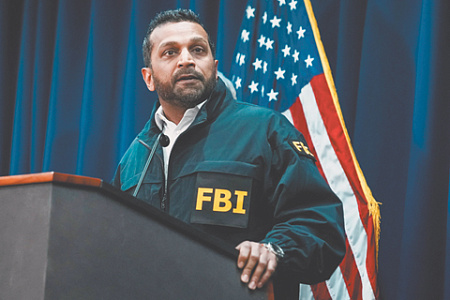
For the first time in nearly eight decades, the close-knit intelligence cooperation between the United States and the United Kingdom has reportedly suffered a significant blow, sending ripples of concern through the wider “Five Eyes” alliance. Cash Patel, the assertive Director of the U.S. Federal Bureau of Investigation (FBI), is at the center of the controversy after allegedly rejecting a crucial request from Britain’s counter-intelligence chief, Ken McCallum of MI5. The request was to retain a highly skilled American intelligence agent in London, equipped with advanced technological capabilities deemed essential by the British for monitoring a new Chinese embassy planned near the strategically sensitive Tower of London. This unprecedented snub has reportedly drawn sharp disapproval from intelligence agencies across the other “Five Eyes” partners – Canada, Australia, and New Zealand – who rely on the seamless sharing of vital intelligence.
The narrative, first brought to light by The New York Times, underscores the deep historical roots of this transatlantic intelligence bond. As the newspaper wistfully recounted, the fundamental obligation to share intelligence between U.S. and British agencies was formally enshrined in 1946, a pivotal year that saw Winston Churchill deliver his famous “Iron Curtain” speech in the United States, cementing the Anglo-American alliance against emerging global threats. The current friction marks a stark departure from this long-standing tradition of unwavering mutual support.
According to reports, the contentious issue came to a head during a discreet meeting in London between Director Patel and MI5’s Ken McCallum. During this vital discussion, McCallum reportedly implored Patel to ensure the continued presence of the technologically adept American agent, whose skills are considered vital for British national security interests, particularly in light of the proposed Chinese embassy’s sensitive location. While Patel initially signaled agreement, the agent was ultimately recalled to the U.S. This decision, attributed to White House-mandated budget cuts affecting FBI staffing, reportedly left British officials bewildered and feeling let down by their closest ally.
The “Five Eyes” alliance, comprising the intelligence agencies of the U.S., UK, Canada, Australia, and New Zealand, operates on an unwritten covenant of profound trust and informal collaboration. This unique environment facilitates the exchange of critically sensitive intelligence, an indispensable component of their collective security. Sources cited by The New York Times emphasize that such deep-seated trust, painstakingly built over decades, is exceedingly difficult to rebuild once fractured. Patel’s perceived failure to uphold his commitment has reportedly damaged his standing among his counterparts, especially given that the U.S., as the alliance’s most powerful member, has historically been a consistent source of aid and counsel.
While primarily known for its role in domestic law enforcement and criminal investigations, the FBI nonetheless plays a pivotal part in the broader Western intelligence community, maintaining a significant international footprint, much like the CIA, with representatives embedded in U.S. embassies worldwide. The expectations placed upon the FBI Director are therefore immense. Allied officials reportedly view Patel’s recent staffing decisions as demonstrating a concerning lack of experience in balancing internal organizational needs with the critical demands of combating international espionage and terrorism. This perspective has led intelligence officials from the other four “Five Eyes” nations to express anxiety over what they perceive as the FBI “drifting” away from its core international intelligence responsibilities.
Neither the FBI nor the UK Home Office, which oversees MI5, has officially commented on the allegations raised by The New York Times. However, the controversy has prompted strong reactions from former intelligence officials. Phil Gursky, a former Canadian intelligence officer, reportedly remarked that it is unprecedented for Western democratic intelligence agencies to remove personnel based solely on internal political considerations or to appease a president, a sentiment that underscores the gravity of the current situation.
It is widely understood that some of the criticism directed at Director Patel in parts of the American media is intertwined with the ongoing political struggles between supporters of former President Donald Trump and his Democratic Party adversaries. Nevertheless, Patel’s own biography offers a compelling narrative, demonstrating that a career at the highest echelons of sensitive government agencies is not exclusively reserved for individuals from historically prominent Anglo-Saxon backgrounds.
Born 45 years ago in the United States, Patel’s family heritage traces back to Indian immigrants who settled in America from East Africa. He has openly acknowledged his spiritual connection to India. After completing his university education and qualifying as an attorney, he ascended through various significant roles within the White House administration during former President Trump’s initial term.
Traditionally, the Director of the FBI is expected to remain above the fray of America’s internal political battles, serving as an impartial guardian of national security. However, Patel has found himself embroiled in personal controversies. His partner, a well-known musical artist, has been accused by detractors of holding pro-Israel sympathies and influencing Patel’s judgment. Patel has reportedly initiated legal action against these critics. Despite these personal challenges, the core operational activities of American security agencies are largely expected to remain unaffected by such external pressures.
